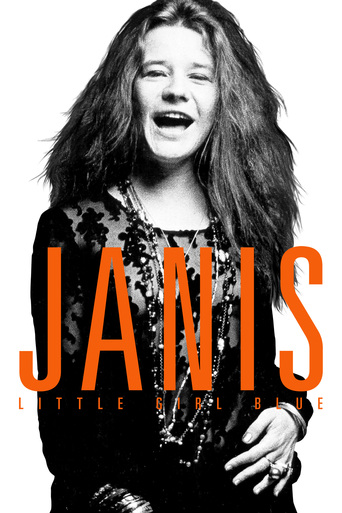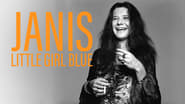PartialMovieViewer
I remember listening to Janis while she was alive, and I was not a fan during her life. Now that she has been gone for so many years, I still can't stand her. Nothing against her, I feel the same way about Morrison and the 'Doors.' Neither of these did anything for me and I certainly did not miss them. The movie/documentary is a bit pandering and over-the- top is OK...but not honest. One can not stop people on a path to self-distraction. I am so saddened and somewhat offended when troubled souls are elevated to some iconic status, marched through media tabloids as 'great' people. These folks are suffering and some had honesty might succeed in saving them. Nah...the documentary seems to miss the mark.
morrison-dylan-fan
Whilst I have heard some of her hit singles and the tragic history of being part of the "27 club" I for someone have never got round to giving a good listen to Janis Joplin.Taking a look at reviews on IMDb's European Cinema board,I spotted a fellow IMDber praise a Joplin doc that they had seen on the BBC.Finding the movie on BBC iPlayer,I decided it was time to uncover the pearl.The outline of the doc:Growing up in a small town,Janis Joplin finds herself being an outcast in university, with her fellow students voting her "Ugliest Man on Campus." Feeling a strong connection to Blues music,Joplin decides to leave her small town for the free-wheeling spirit of California.As she puts all of her emotions into her music,Joplin finds herself struggling to get a grip on her own blues. View on the doc:Bringing Joplin's notes and lyrics off the page and onto the screen, the great musician Cat Power gives a soulful narration as Joplin,with Power's voice getting the deeply emotive words of Joplin smoothly across.Uncovering unseen performances,director Amy Berg keeps the narration in the background and allows Joplin to do the talking,by washing the screen in explosive footage from gigs which are placed in the era with Berg scattering hand-made posters and ripped concert tickets across the stage.Interviewing Joplin's band mates and family members,Berg strikes a fine balance in giving everyone an equal say,which allows for the lack of a dividing line between Joplin the person and Joplin the performer to be fully displayed,as Janis Joplin sings the Blues.
Dr Jacques COULARDEAU
Nostalgia has no limit, no limits, absolutely none. It is in fact the frontier to dreams and the future, no matter how you look at it. With no nostalgia there is no imagination – nothing new under the sun except new assembly of old, eternal, ever present emotions.And emotional you have to be and get with this invocation of Janis Joplin.It was the dense and tumultuous time of "Fritz the Cat" (1972) and "Zabriskie Point" (1970). Three great artists and performers among the most innovative minds of their time, Jimi Hendrix (1942-1970), Janis Joplin (1943-1970) and Otis Redding (1941-1967) died, two of an overdose and one in a plane crash. What a loss.The only woman in that triad, who was not the first woman in rock-and- roll in spite of what is said in the film, was the direct white heiress of blues, jazz and black music, all represented by Aretha Franklin (1942-and still living and kicking, and even making Obama wax sentimental in public) who was a black woman in this field before Janis Joplin. The film does mention her and the fact she was the model, the inspirational muse of Janis Joplin, which made Janis Joplin second in this music, even if she was the first white woman.What did Janis Joplin contribute to the world of modern amplified polyrhythmic music? A lot, indeed a lot, even more than just a plain lot.She had very hard, realistic and powerful lyrics that exposed society the way it was felt and suffered by young people in the 1960s and early 1970s. She had a singing style and voice that were unique at the time among women and first of all white women singers. She was possessed in her music by hope for sure, but with the conscious certainty that this hope would be betrayed, and it was of course, naturally and without any failure. We can always count on one thing from this rotten world we live in: it will betray our hope, our hopes and even our plain submissive obedient and subservient wishes. And betrayal is the major master word of this hell of a life we have to live through. In spite of the flashes of bliss from time to time when an emotion is responded to emotionally, when our love is received and shared with pure love and not short term greed or lust.It was betrayed by the use of drugs that made the hopeful forget the world cannot change in the proper direction, in the direction of human freedom, if you exit it by artificial means into virtual dreams of psychedelic freedom that turned into nightmares, like in the film "More" (1969) or those I have already quoted. That means the world can only change in the proper direction if you remain conscious and united towards that objective that you in no way control but onto the outcome of which you can weigh and even be of some influence by making your collective parameter heavier in front of the millions of other parameters that dictate history. Janis Joplin could be one of those who mobilized millions of individuals into pushing history in the right direction, which did not mean left or right, but right and not wrong. In the countries where they twinned up right with left and not wrong, they were made the slaves of decisions taken by others and of cosmic phenomena beyond any human control.Betrayed it was by the use of violence and here the film is silent about the Black Panthers and their being systematically killed by the dozens in Chicago or other places. And that's what one should only care about in that period: the systematic repression of any protest around and after 1968. No allusion to the assassination of Martin Luther King and Senator Robert Kennedy. No mention of the Vietnam War and the millions of people killed or maimed over there in the name of democracy and freedom for – and only for – the Americans and maybe here and there the West reduced to its anticommunism of Mathuselah's ancient times. And that was then "Good Morning Vietnam" (1987) that will take twenty years or so to come out of its Pandora's box of napalm and other green berets' adventures, capers, brutality and barbarity.Betrayed by all sorts of crooked, more or less crooked, rather more than less crooked, politicians from A.B. Johnson to Richard Nixon, via Spiro Agnew; and Ronald Reagan was just in the near future. There the worst part is that this systematically warped democracy enables the majority of those who want tranquility and no disruption in their everyday life and comfort, be they favorable to change or not, to always have the last word. The last reform of importance was the 26th amendment lowering voting age from 21 to 18, ratified in 1971, though not the lowering of drinking age and a few other age limits of that type, like being able to enter the music "saloons" or music bars on Bourbon Street in New Orleans and many other places where the best music was performed. It did not change anything in the logic of the political system, hence the social dependence we all cling to. And Nixon was reelected in 1972 by all these young 18, 19 and 20 year old voters. The debate was raging about this lowering of voting age from what I remember when Janis Joplin was at the highest point of her stardom just when she "decided" to OD in a motel room, alone.You can make a star out of a person but that person's solitude is even greater than before because stars are NOT dancing together. And what's more these stars are black stars and we all know what happens to black stars that could be starry star-like black holes.Dr Jacques COULARDEAU
clarkj-565-161336
This documentary really brought me back to the 60s and 70s. It never ceases to amaze me how tough it is to be a creative artist, just think Brian Wilson or Amy Winehouse. We are introduced to Janis's early life and the many struggles she had to go through growing up. She leaves for California and finds her roots and her tribe with Big Brother and the Holding Company. The live performances really show the incredible rapport she had with her audience during a concert. Coming down from such a high must have been an insupportable task. Janis finds a true love during her time in Brazil which for her was very important. Her letters to her family and friends were filled with hope and optimism right up to her tragic death. Interviews with her various friends and colleagues all painted a picture of a very unique and spontaneous person. The world was truly inspired by a pure spirit.




